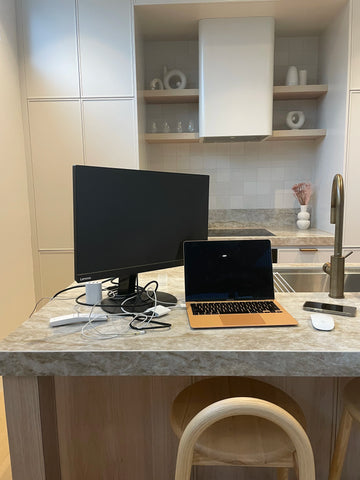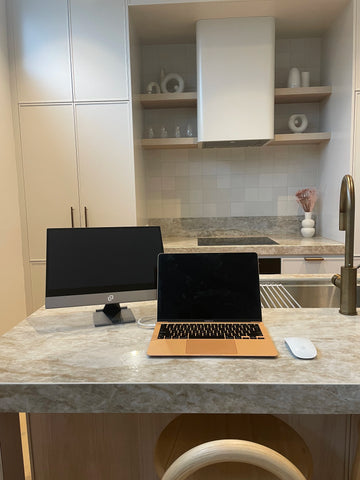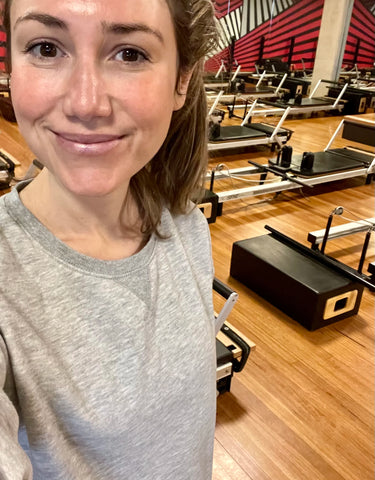By Hannah Mansur
Making the switch to remote working should’ve been simple.
The description is in the name after all. Just work from anywhere except the office.
If only it were that easy.
While the allure of less commuting and a more family-friendly schedule drew me to the world of remote work, I soon discovered that it comes with its own set of challenges.
As a mum of three and a General Manager with Freelance business on the side, I consider myself to be a flexible working expert. But it hasn’t always been that way. I made mistakes early on that chipped away at my productivity and professionalism. Here are five traps that I fell into, and my best remote working tips to help you avoid them.
1. Assuming I needed to kit out a complete home office
When I officially started working remotely, mentally I went shopping. I’m not alone, there are entire Pinterest boards dedicated to home office chic.
My argument centred around the need for dual screens, I need a monitor to work because constantly toggling between tabs isn’t a good use of anyone's time. The monitor I planned to lug home from the office would need a nice sturdy desk, dedicated power board and enough connections to require an expensive (but visually pleasing) cable management system.
Of course I’d also need a special chair, lamp and maybe a printer and a stack of unopened Post Its for good measure. I could easily have dedicated two weeks to working on this fitout.
Fortunately for my productivity and my bank balance, my city living situation didn’t include a dedicated home office. And, honestly, I knew I’d mostly be working from the sofa, cafes, my clients’ offices and on the go.
I didn’t need to set up a home office, but I did need more screen real estate, which is why I invested in the EspressoDisplay, a ridiculously thin portable monitor. It’s super lightweight at less than a kilo and connects to my laptop with a single cable (no charger needed). I love that I can easily fit it plus my laptop in my bag without feeling like a packhorse. At home it makes a neat little stack on the bookshelf when I’m not working.


Image caption: Before, after espresso display
Oh and that printer? Redundant. The EspressoDisplay can be used like a tablet so I can review and mark up documents using the stylus pen. Editing is also super easy because I can copy and paste across the various screens which feels very sci-fi.
2. Overcommitting to communication channels
I work for a number of clients and also manage teams remotely. Between email, Slack, WhatsApp, WeChat, GDrive, Monday and Airtable notifications, and Canva comments, I could spend all day checking and still miss important messages.
We won’t talk about the time I spent three hours editing an outdated draft, because I didn’t see the notification for the refreshed version. Let’s just say, lessons were learnt.
Now I agree on communication channels with my clients and teams upfront. This format works well if you want to ensure effective communication in remote teams:
- Urgent comms: call me or send a text
- Team chat: Slack
- Project/progress updates: Airtable or Monday
- Formal docs (think final deliverables, invoices, contracts): email
3. Forgetting that first impressions still count, even when they’re over Zoom
Nothing will undermine your credibility like a crappy camera angle. When you’re working remotely, you have less opportunities to leave an impression than you would working together all day. Your clients and colleagues can only make assumptions based on what they see. Remember your Zoom meeting etiquette. Don’t be that person who does an entire video call with the camera angled up their nose because they can’t figure out their tech set up. Or the one who can’t present to the group without duplicating their screen 16 times.
Ok so neither of those were me, but I was a cringing witness. To be fair, mistakes are inevitable when you’re trying to do everything over a single laptop screen. Thankfully, adding in an EspressoDisplay makes it almost impossible to mess up virtual collaboration. Having a double screen means I can see my audience and my presentation at the same time, so I can actually gauge their reactions and adapt what I’m doing if it’s not landing as planned. The EspressoDisplay system works with all the best collaboration software like Mural, Microsoft Whiteboard, JamBoard, FigJam, Miro and more so I can run my online workshops from anywhere as if I were facilitating in person with a whiteboard.

Image caption: My remote work setup for running morning WIP meetings
Best of all, every display comes with EspressoFlow technology which lets me design the layout of my screen and then remembers it so everything is right where I left it when I’m ready to work again. I’ve customised presentation mode settings for my external screens too, so that whether I’m presenting in person or virtually I only share the information I want to- and not the contents of my private Slack chats.
4. Working all the hours
When I dropped the commute time, I revelled in the freedom to set my own schedule.
I could work before the kids woke up, or I could work between going to the gym and meeting a friend for lunch, or I could work at night.
I was going to have sooo much work-life balance while remote working.
In reality, I worked all the time, and when I wasn’t working I stressed about not working.
This left no space for big picture thinking. Like most people, my best strategic and creative ideas come to me when I’m not “working”.
I had to design this time back into my day.
I found the balance by setting up a daily routine that mimics the structure of a 9-5, with more flexibility. I have set milestones in my day which signal the beginning or end of a work period. Like an 8.45am gym class, followed by a two hour working session in the cafe at the gym. The afternoon is divided into chunks and once the kids are in bed, there’s another 2 hours available. This structured approach can extend to travelling too; I use check-in times and meals as my planned punctuation points.

Image caption: Reformer Pilates done, time for a work session
The key is to PLAN the shape of my working day and week ahead of time rather than constantly reinventing it. Having this structure also helps me to predict delivery dates and share my available windows for meetings. I worried about appearing unavailable, but my clients actually value the predictability.
5. Stooping over my laptop
I know, I know, an article about remote working which talks about Ergonomics. Groundbreaking.
I knew about the importance of proper posture and yet I managed to max out the annual cover limits for Physiotherapy on my health insurance by February.
Being sore and stiff massively impacted my productivity, I worked slower and I had to cram all those trips to the physio into my already jammed schedule, eating up my limited family time. My neck was wrecked from hunching over my laptop before I invested in an EspressoDisplay. Portable monitors for remote work make such a difference. I love that now I can adjust the height and tilt the display when I’m working so everything is at eye level and I’m sitting up properly no matter where I’m working from.

Image caption: Heavy bags are terrible for spine health. Sort through your bag weekly and chuck out anything you don’t absolutely need. My essentials: emotional support waterbottle, laptop and EspressoDisplay.
All the trips to the physio paid off, I could conduct a masterclass in ergonomics for remote workers. If you are sitting down, do this right now:
- make sure your ears, shoulders and hips are in a vertical stack
- drop your shoulders
- make sure your feet are BOTH flat on the floor, no crossing legs
- And if you have a screen, raise it to eye level, you don’t want to be looking down or up.
How much better does that feel?
There are so many small tweaks you can make that will have a big impact on your productivity.
And that’s the great thing about remote working, you’re in control. Yes there are remote working challenges, but you have so much more freedom to try new things. Learn from my mistakes, make some of your own.
Did you manage to avoid remote working traps? Share with us your productivity tips for remote work in the comments below.
